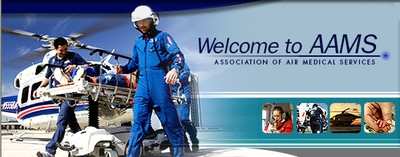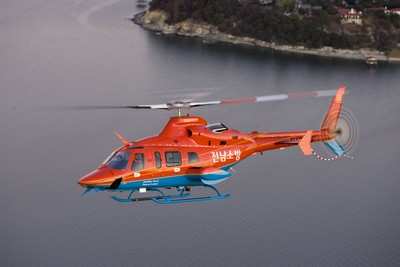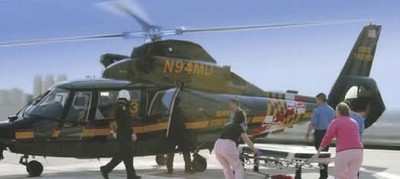Fri, Apr 24, 2009
Stresses Need for Funding of Low-Altitude Infrastructure,
Airport Improvements
Testifying before a crowded hearing, this week, on the Oversight
of Helicopter Medical Services, Association of Air Medical Services
(AAMS) President Sandy Kinkade offered an overview of the medevac
helicopter industry and discussed the need for greater funding for
airport and low-altitude infrastructure improvements, among
other initiatives aimed at making patient air transport
safer. The hearing was called by the U.S. House of Representatives
Aviation Subcommittee to better understand and evaluate the
complex, overlapping factors that relate to safe air-medical
operations.

"Most people don't realize the life-and-death role that
emergency medical helicopters play in our healthcare system. But
the critically ill and injured are airlifted once every 90 seconds
in our nation. That's why it is important not to underestimate the
value of air medical services - because the life saved might be
yours or a loved one's," said AAMS President Sandy Kinkade.
Specifically, AAMS supports improving the low-altitude aviation
infrastructure by expanding the Airport Improvement Program to
include private-use hospital helipads, regional airports and other
routinely utilized locations; and directing more Federal Aviation
Administration (FAA) funding and research toward expanding the
capacity of low-altitude, off-airport weather reporting. AAMS also
is in favor of increasing the number of automated weather
observation stations (AWOS) and utilizing such technologies as the
Helicopter Emergency Medical Systems (HEMS) Weather Tool (www.weather.aero/hems/).
Chief among the association's safety proposals is that all medical
night-flight operations be required to either utilize night vision
goggles (NVGs) or similar enhanced-vision systems, or be conducted
strictly under instrument flight rules (IFRs), in a timeline
established by the FAA and in coordination with air medical service
providers. Today, AAMS recommended that Congress further this
process along by appropriating funds for the FAA to expand its
capabilities surrounding the certification and approval of NVGs or
similar enhanced-vision systems.

In addition, AAMS has asked that funding and study be directed
towards associated approach and departure procedures to facilitate
a seamless transition from visual flight rules (VFR) to instrument
flight rules (IFR). While noting that it is a strong proponent of
mandated enhanced-safety technologies, AAMS also advised that such
requirements offer operators flexibility in choosing enhancements
that ensure the greatest safety suited to their unique operating
environments.

To date, AAMS has taken several proactive steps aimed at
increasing HEMS safety, including coordinating meetings between the
FAA and air medical industry aviation experts, and holding a
full-day Safety Summit last July aimed at identifying and
incorporating effective cultural and operational safety
enhancements.
More News
Aero Linx: International Federation of Airworthiness (IFA) We aim to be the most internationally respected independent authority on the subject of Airworthiness. IFA uniquely combi>[...]
Ultrahigh Frequency (UHF) The frequency band between 300 and 3,000 MHz. The bank of radio frequencies used for military air/ground voice communications. In some instances this may >[...]
A Few Questions AND Answers To Help You Get MORE Out of ANN! 1) I forgot my password. How do I find it? 1) Easy... click here and give us your e-mail address--we'll send it to you >[...]
From 2019 (YouTube Edition): Learning To Paint Without Getting Any On Your Hands PPG's Aerospace Coatings Academy is a tool designed to teach everything one needs to know about all>[...]
Also: Sustainable Aircraft Test Put Aside, More Falcon 9 Ops, Wyoming ANG Rescue, Oreo Cookie Into Orbit Joby Aviation has reason to celebrate, recently completing its first full t>[...]
 ANN's Daily Aero-Linx (05.06.25)
ANN's Daily Aero-Linx (05.06.25) ANN's Daily Aero-Term (05.06.25): Ultrahigh Frequency (UHF)
ANN's Daily Aero-Term (05.06.25): Ultrahigh Frequency (UHF) ANN FAQ: Q&A 101
ANN FAQ: Q&A 101 Classic Aero-TV: Virtual Reality Painting--PPG Leverages Technology for Training
Classic Aero-TV: Virtual Reality Painting--PPG Leverages Technology for Training Airborne 05.02.25: Joby Crewed Milestone, Diamond Club, Canadian Pilot Insurance
Airborne 05.02.25: Joby Crewed Milestone, Diamond Club, Canadian Pilot Insurance





